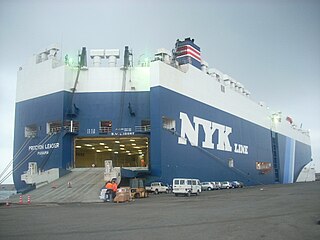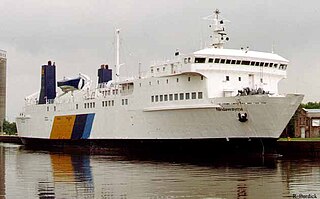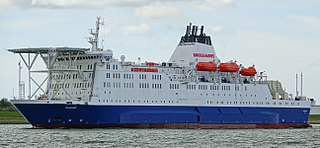See also
- Empire Viking, several Empire ships, see List of Empire ships (U–Z)
- Viking (disambiguation)#Ships
MS Viking may refer to the following motorships:
Silja Line is a Swedish-Finnish cruiseferry brand operated by the Estonian ferry company AS Tallink Grupp, for car, cargo and passenger traffic between Finland and Sweden.

Viking Line Abp is a Finnish shipping company that operates a fleet of ferries and cruiseferries between Finland, the Åland Islands, Sweden and Estonia. Viking Line shares are quoted on the Helsinki Stock Exchange. Viking Line is operated from Åland.

The MS Estonia was a cruiseferry built in 1980 for the Finnish company Rederi Ab Sally by Meyer Werft, in Papenburg, West Germany. She was employed on ferry routes between Finland and Sweden by various companies until 1993, when she was sold to Nordström & Thulin for use on Estline's Tallinn–Stockholm route. The ship's sinking on 28 September 1994, in the Baltic Sea between Sweden, Finland and Estonia, was one of the worst peacetime maritime disasters of the 20th century, claiming 852 lives.
The Vikings were seafaring Scandinavians.

Moby Orli is a cruiseferry owned by Moby SPA. Until September 2010, she was known as Pride of Bilbao, operated by P&O Ferries on their Portsmouth–Bilbao route. The vessel was built in 1986 as Olympia at the Wärtsilä Perno Shipyard in Turku, Finland for Rederi AB Slite, Sweden for use in Viking Line traffic. She was sold by Irish Continental Group to St. Peter Line in December 2010 and renamed Princess Anastasia and operated on the Saint Petersburg – Helsinki – Stockholm – Tallinn route. In 2022 she was withdrawn because of the conflict in Ukraine, transferred to Moby Lines and sailed to Messina for refurbishment. She was set to return to service in the Mediterranean.

Roll-on/roll-off ships are cargo ships designed to carry wheeled cargo, such as cars, motorcycles, trucks, semi-trailer trucks, buses, trailers, and railroad cars, that are driven on and off the ship on their own wheels or using a platform vehicle, such as a self-propelled modular transporter. This is in contrast to lift-on/lift-off (LoLo) vessels, which use a crane to load and unload cargo.

MS Mega Victoria is a cruiseferry owned by Corsica Ferries. She was formerly owned by Viking Line as MS Amorella and operated on the route Turku–Mariehamn–Stockholm and from 2022 Helsinki-Mariehamn-Stockholm. She was built in 1988 by Brodosplit in Croatia, then Yugoslavia.

Mega Andrea is a cruiseferry owned and operated by Corsica Ferries Sardinia Ferries. She was formerly owned and operated by the Estonia-based Tallink as the MS Silja Festival, and used on their route connecting Riga, Latvia to Stockholm, Sweden. She was built in 1986 by Wärtsilä Helsinki Shipyard, Finland, for Effoa as MS Wellamo for use on Silja Line traffic. She was rebuilt in 1992 at Lloyds Werft, Bremerhaven, Germany as Silja Festival. In 2008 the ship was transferred from the Silja Line fleet to that of Tallink, but she retained her Silja-prefixed name. After being replaced by MS Isabelle on the Stockholm-Riga route in May 2013 she was chartered as an accommodation ship to Kitimat, British Columbia. She was then sold in early 2015 to Corsica Ferries.

Celestyal Crystal, previously Louis Cristal, is a cruise ship operated by the Cyprus-based Celestyal Cruises and previously Louis Cruise Lines, both in the Louis Group. The ship was originally built as the cruiseferry MS Viking Saga in 1980 at Wärtsilä Perno Shipyard and Turku Shipyard, Turku, Finland for Rederi Ab Sally. In 1986 she was renamed MS Sally Albatross, and rebuilt into a cruise ship the following year. The ship was destroyed by a fire in 1990, and completely rebuilt at Finnyards, Rauma, Finland. She was re-delivered in 1992, still named Sally Albatross. After partially sinking 1994 she was rebuilt at Industrie Navali Meccaniche Affini, La Spezia, Italy, re-entering service as MS Leeward for Norwegian Cruise Line. Subsequently she sailed as MS SuperStar Taurus for Star Cruises, MS Silja Opera for Silja Line and spent a year laid up as MS Opera prior to entering service with her current owner in 2007.

The MV Manx Viking / Nindawayma was a passenger, truck and car ferry, whose last active service was on Lake Huron, operated by the Owen Sound Transportation Company; under contract to the Ontario Ministry of Transportation. In Canadian service she served the Highway 6 route between Tobermory and South Baymouth, Manitoulin Island from 1989 to 1992 alongside the MS Chi-Cheemaun.

The MS Anemos is a cruiseferry, built in 1980 by Wärtsilä Turku shipyard, Finland for SF Line, one of the owners of the Viking Line consortium. She served as Rosella on Viking Line's Kapellskär–Mariehamn route before being sold to Aegean Sea Lines as Anemos in January 2023.

The MS Bluefort was an accommodation vessel owned by the Canadian-based company Bridgemans Services Group LP. She was built in 1979 as a car/passenger ferry by Meyer Werft, Papenburg, Germany as Diana II av Slite for Rederi AB Slite for use in Viking Line's traffic. She has also sailed under the names Diana II, Vironia, Mare Balticum, Meloodia and ARV 1.

The MS Rigel III is a cruiseferry owned by the Greek-based company Ventouris Ferries. She was built in 1979 as MS Turella by Wärtsilä Turku shipyard, Finland for SF Line for use in Viking Line traffic. In 1988 she was sold to Stena Line, becoming MS Stena Nordica. In 1996, she was transferred to Lion Ferry and was renamed MS Lion King. In 1998, she was sold to Tallink and renamed MS Fantaasia. As Fantaasia she also sailed under charter to Algérie Ferries, Comanav and Kystlink during the years 2005–2008. Following the end of her charter to Kystlink in 2008 the latter company bought her, renaming her MS Kongshavn. After Kystlink was declared bankrupt in late 2008 the ship was laid up until sold to the Croatia-based ferry operator Blue Line International, and operated on their service between Split and Ancona as MS Regina della Pace. In 2017 the ship was sold to the Greek-based company Ventouris Ferries and is currently operating on the route Bari-Durres.

The Finnish maritime cluster is a cluster of Finnish companies in maritime industries. In 2016 the total turnover was estimated at 13 billion euros and it employed 48,000 people.

The Baltic Sea is crossed by several cruiseferry lines. Some important shipping companies are Viking Line, Silja Line, Tallink, St. Peter Line and Eckerö Line.
Olau Line was a shipping company that existed from 1956 to 1994. It operated a ferry service from the United Kingdom to the Netherlands from 1974 until 1994. Originally based in Denmark, the company passed under the ownership of the German TT-Line in 1980.
Viking One, Viking 1, Viking I, or variant, may refer to:
Viking Two, Viking 2, Viking II, or variant, may refer to: